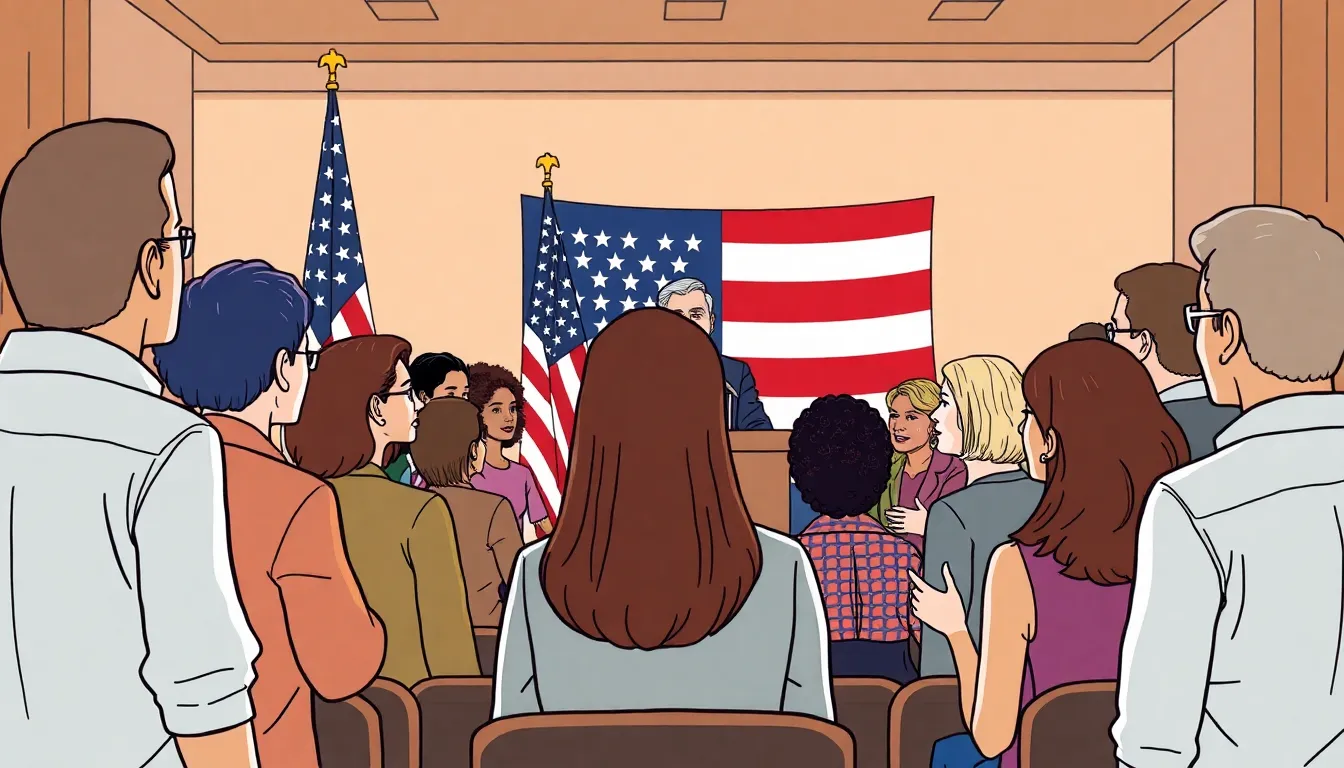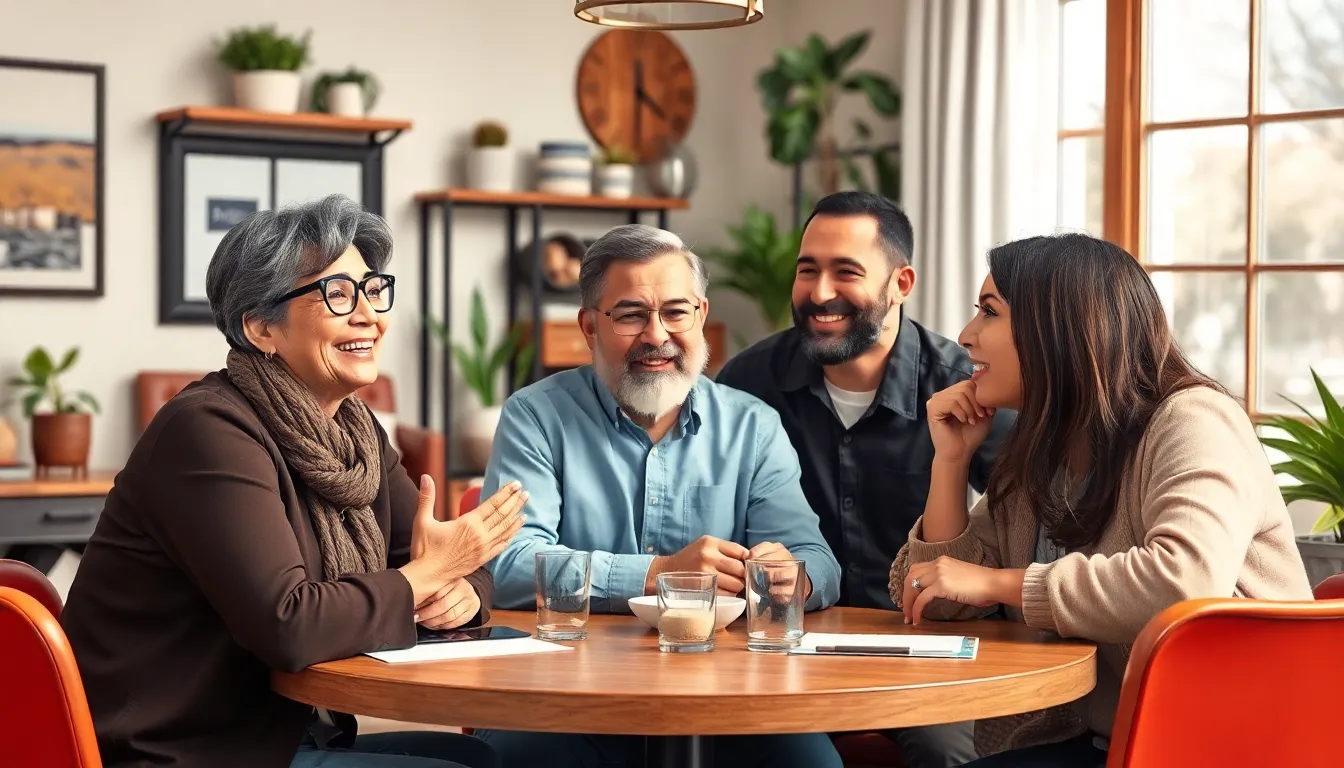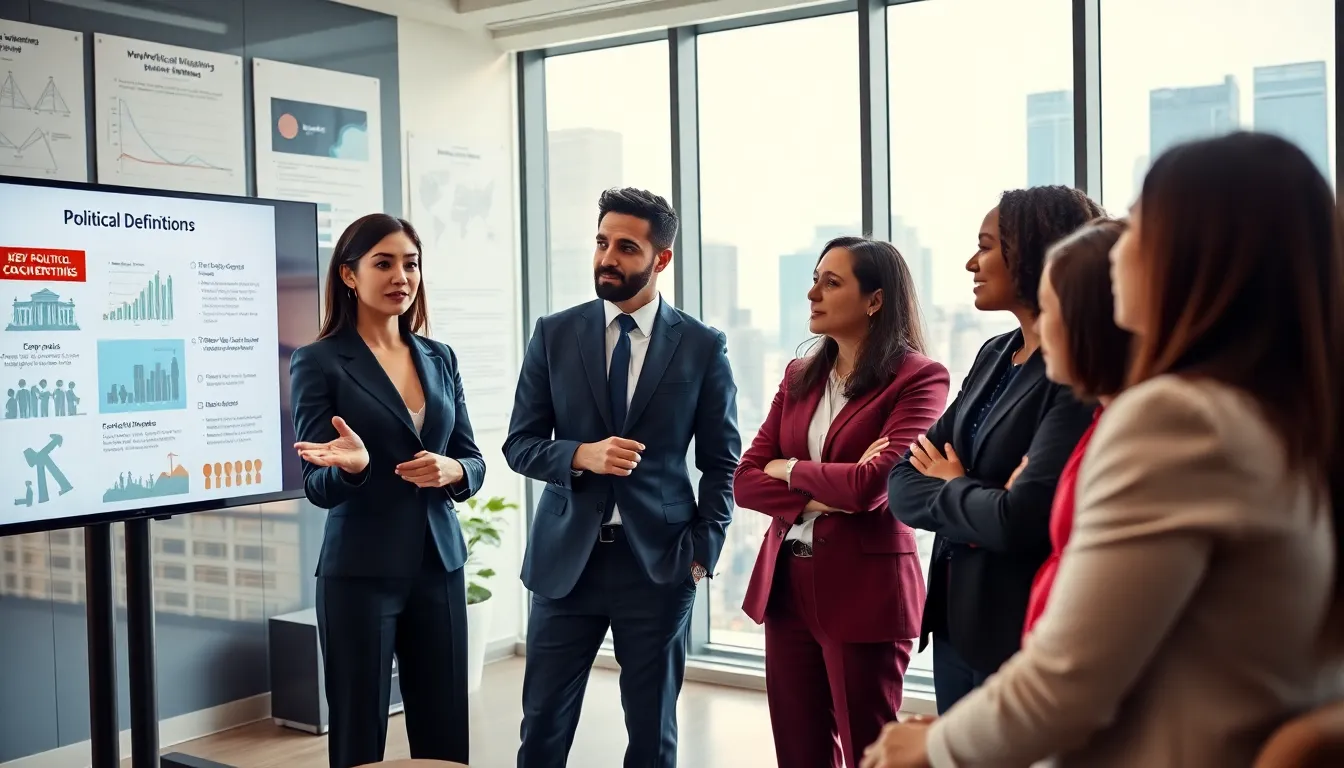Political discussions can feel like a high-stakes game of chess, where every move could spark a checkmate—or a meltdown. Navigating these conversations requires not just knowledge of the issues but also a sense of humor to defuse tension. After all, who knew that discussing tax policies could turn into a comedy show?
In a world where opinions clash like titans, mastering the art of political discourse is essential. Whether you’re at a dinner party or stuck in a Zoom meeting, understanding how to engage in these discussions can make all the difference. So grab your favorite snack, put on your thinking cap, and get ready to dive into the wild and wacky world of political debates. You might just find that laughter is the best way to bridge divides and spark meaningful conversations.
Table of Contents
ToggleOverview of Political Discussions
Political discussions involve conversations about governance, policies, and societal issues. They serve as platforms for expressing opinions and exchanging ideas on critical matters.
Definition of Political Discussions
Political discussions refer to dialogues focused on political topics. These conversations can occur in various settings, from casual gatherings to formal debates. Engaging in these discussions allows individuals to explore different viewpoints. Participants analyze public policies, party platforms, and societal challenges. Overall, political discussions play a key role in democratic societies by fostering civic engagement.
Importance of Political Discussions
Political discussions hold significant importance in society. They promote awareness of current events and political processes. Additionally, these conversations encourage critical thinking and informed decision-making. Exposure to diverse perspectives enhances understanding of complex issues. By participating in discussions, individuals can contribute to the democratic process. Constructive debates often lead to consensus-building and collaborative solutions. Engaging in political discourse reinforces civic responsibility and community connection.
Types of Political Discussions

Political discussions occur in varied formats, each contributing uniquely to the dialogue about governance and societal issues. Understanding these types enhances engagement and comprehension.
Formal Political Discussions
Formal political discussions typically take place in structured environments. Examples include debates, town hall meetings, and legislative sessions. Participants focus on specific issues, presenting research-based arguments and evidence. These discussions aim to clarify policies, influence decision-makers, and engage constituents. The use of formal protocols helps maintain order, fostering respectful exchanges. Furthermore, these settings often attract experts and officials, bringing credibility to the conversation.
Informal Political Discussions
Informal political discussions happen in casual settings, such as gatherings or social media platforms. Friends or family members engage in these dialogues without rigid structures. Topics can range from daily news to broader policy debates. Humor often plays a role in easing tension, making diverse opinions more approachable. Participants share personal experiences and perspectives, creating a relatable atmosphere. This type of dialogue encourages a wider audience to engage in political issues, promoting grassroots awareness and civic engagement.
Platforms for Political Discussions
Political discussions take place across various platforms, facilitating engagement among individuals with diverse viewpoints. Understanding each platform’s unique characteristics enhances participation and discourse quality.
Online Platforms
Social media networks serve as significant online platforms for political discussions. Sites like Twitter, Facebook, and Reddit allow users to share opinions and insights instantly. Engaging multimedia, such as videos and infographics, helps convey complex ideas effectively. Virtual forums and blogs also create spaces for in-depth discussion involving various stakeholders. Comment sections enable interactive dialogues, fostering immediate responses and exchanges. With these platforms, user-generated content can influence perceptions and drive conversations around pressing issues.
In-Person Gatherings
In-person gatherings provide a different dynamic for political discussions. Town halls and community forums invite local citizens to engage directly with representatives. Such settings promote transparency and accountability, allowing attendees to voice concerns and ask questions. Social events, like dinner parties and community picnics, enable casual conversations that can break down barriers. Conversation starters may revolve around current events or personal experiences. Networking opportunities arise during these gatherings, helping individuals forge connections with like-minded peers or expand their perspectives through constructive dialogue.
Impact of Political Discussions
Political discussions significantly shape public attitudes towards governance and policy issues. Engaging in these dialogues allows individuals to form informed opinions based on diverse viewpoints. Studies indicate that exposure to varied political perspectives enhances critical thinking. Many people find that discussing politics with others increases their understanding of complex issues, which can shift public sentiment over time.
Influence on Public Opinion
Influencing public opinion relies heavily on the exchange of ideas during political discussions. Various platforms amplify voices and ideas, spreading information rapidly across communities. Research shows that conversations in informal settings often lead to changes in beliefs and attitudes. Engaging people in discussions encourages them to reflect on their viewpoints, fostering a deeper understanding of societal issues. Conversations that incorporate personal experiences often resonate more deeply, enhancing relatability and willingness to accept new ideas.
Role in Democracy
Political discussions play an essential role in a functioning democracy. They promote civic engagement and enable citizens to invest in their communities. Through dialogue, individuals articulate concerns, facilitating accountability among elected representatives. Multiple studies highlight that active participation in discussions fosters collaboration and collective decision-making. When people engage in meaningful debates, they strengthen democratic values and build a more informed electorate. Such interactions lay the groundwork for consensus-building and lasting social change.
Challenges in Political Discussions
Political discussions often face several hurdles affecting their effectiveness. Miscommunication and disagreements frequently arise, complicating dialogue.
Miscommunication and Disagreement
Miscommunication occurs when individuals interpret messages differently. Clear articulation of thoughts is crucial to avoid confusion. Listeners may miss nuances, leading to misunderstandings. Disagreement can stem from personal beliefs and values, making it difficult to find common ground. People might also become defensive when confronted with opposing views, preventing constructive conversations. Encouraging open dialogue and active listening can help mitigate these issues.
Polarization and Toxicity
Political discussions often contribute to polarization, where individuals develop extreme viewpoints. Toxicity increases in environments where hostility replaces civil discourse. Participants may resort to name-calling or personal attacks instead of addressing issues. This toxic atmosphere can deter meaningful engagement and push people away from discussions. Strategies that promote civility, like focusing on shared goals, foster healthier interactions. Encouraging respectful debates can reduce polarization and improve the overall quality of dialogues.
Political discussions play a crucial role in shaping society and fostering democratic values. By engaging in these dialogues individuals not only deepen their understanding of complex issues but also contribute to a more informed electorate. The blend of knowledge and humor in conversations can break down barriers and encourage diverse perspectives.
As people navigate the challenges of miscommunication and polarization they can focus on shared goals to promote civility and understanding. Ultimately political discussions empower citizens to take an active role in their communities ensuring that their voices are heard and their concerns addressed. This engagement is vital for building a more cohesive and collaborative society.





